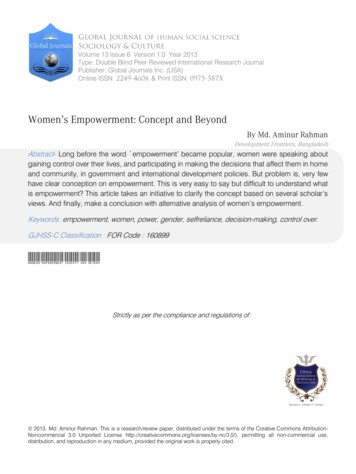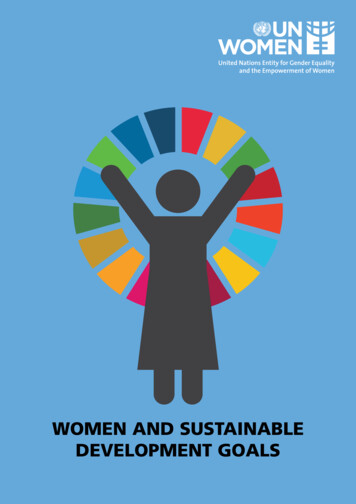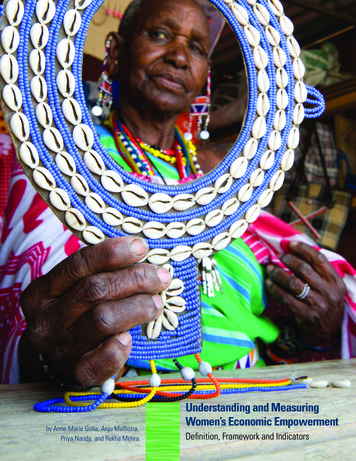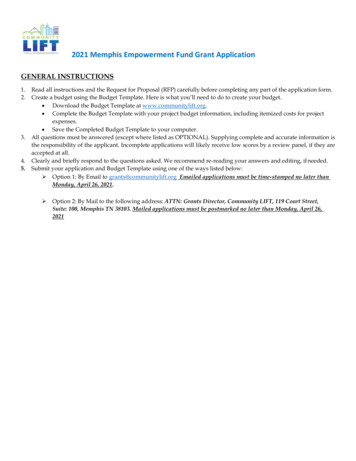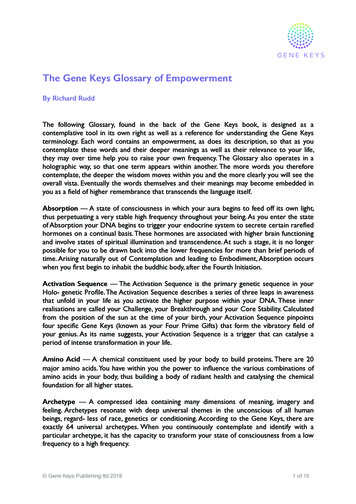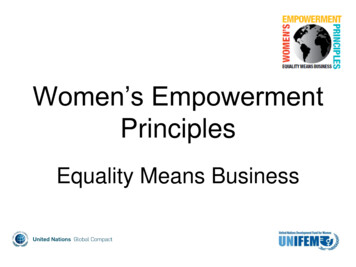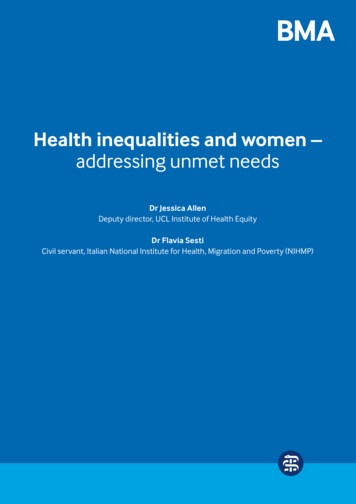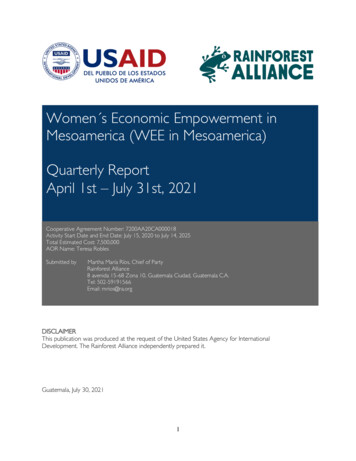
Transcription
Women s Economic Empowerment inMesoamerica (WEE in Mesoamerica)Quarterly ReportApril 1st – July 31st, 2021Cooperative Agreement Number: 7200AA20CA000018Activity Start Date and End Date: July 15, 2020 to July 14, 2025Total Estimated Cost: 7,500,000AOR Name: Teresa RoblesSubmitted byMartha María Ríos, Chief of PartyRainforest Alliance8 avenida 15-68 Zona 10, Guatemala Ciudad, Guatemala C.A.Tel: 502-59191566Email: mrios@ra.orgDISCLAIMERThis publication was produced at the request of the United States Agency for InternationalDevelopment. The Rainforest Alliance independently prepared it.Guatemala, July 30, 20211
Women’s Economic Empowerment in Mesoamerica (WEE in Mesomerica)Quarterly ReportIII quarter of fiscal year 2021Cooperative Agreement No. 7200-AA20-CA00-0018Report Prepared by the Rainforest Alliancefor the Office of Economic Development USAID GuatemalaGuatemala, July 30, 2021Reporting period: April 1 to June 30, 20212
TABLE OF CONTENTS1.EXECUTIVE SUMMARY. 42.INTRODUCCTION . 63.PROGRESS BY PILLAR . 64.3.1.Implementation of Pillar 1: Women Thriving in the Workforce . 63.2.Implementation of Pillar 2. Women who succeed as entrepreneurs . 103.3.Implementation of Pillar 3: Women empowered in the economy . 133.4.Progress in the achievement of indicators . 15ADMINISTRATIVE AND FINANCIAL ISSUES . 164.1.Updating of the Senior Advisory Committee . 164.2.Progress in the development of Initial Environmental Assessment (IEA) . 174.3.Financial Report . 174.4.Fundraising and Leverage Activities . 184.5.Leverage . 185.PRIORITIES AND CHALLENGES FOR THE NEXT QUARTER . 196.COMMUNICATIONS . 208.ANNEXES . 22Annex A: Success Story . 22Annex B: Training Summary Table . 23Annex C: Pause and Reflection Session . 25Annex D: Performance of activities . CALASMADIASOCUCHASODESTYAORCNCGCREDESA, R.L.COICMAN, R.L.COCAFCALAssociation of Forest Communities of PeténCruce a la Colorada Integral Forestry AssociationAsociación Forestal Integral San Andrés PeténEulalense Women's Association for the Integral Development Pixan K'onob'.Alliance of Women in CoffeeMuralla de León AssociationLa Labor Association of Women Coffee ProcessorsKatekas Women's Association for Integral DevelopmentAssociation of Cuchumatanes OrganizationsAssociation for the Sustainable Development of the Yaxhá TerritoryAgreement Officer’s RepresentativeClimate, Nature and Communities in Guatemala programCooperativa Integral de Ahorro y Crédito “Para el Desarrollo de Santa Cruz Verapaz,Responsabilidad LimitadaCooperativa Integral de Comercialización “Mujeres Ak Na leb (Nuevas Ideas)”,Responsabilidad LimitadaCooperativa Cafetalera Capucas Limitada3
COPCOOPLEDE, USDUSGWEEWEBDAWJIChief of onardoOtoniel Delgado Méndez”, Responsabilidad LimitadaCoronavirus disease 2019 is defined as a disease caused by a new coronavirus now calledsevere acute respiratory syndrome coronavirus 2 (SARS-CoV-2).Civil Society OrganizationsOffice for the Defense of Indigenous WomenEscuela Superior del CaféFederation of Cooperatives of the VerapacesStrengths, weaknesses, opportunities, and threatsFundación Hondureña de Investigación AgrícolaFull-time EquivalentFiscal YearHanns R Neumann FoundationInitial Environmental ExaminationHonduran Coffee InstituteIndigenous PeoplesInternational Women Coffee AllianceGuatemalan Ministry of Agriculture and LivestockMost Significant ChangeOrganización, Manejo y ConservaciónAnnual Operating PlanPause & ReflectionRainforest AllianceHonduran Cocoa and Chocolate Women's NetworkUnited States Agency for International DevelopmentUS DollarsGovernment of the United States of AmericaWomen's Economic Empowerment in MesoamericaWomen's Empowerment Business Development ApproachWomen's Justice Initiative1. EXECUTIVE SUMMARYThis document reports on the progress of the Women's Economic Empowerment in Mesoamerica (WEE inMesoamerica) Initiative during the third quarter of fiscal year 2021, April through June. During the quarter, theWEE Activity trained 972 beneficiaries on topics such as leadership, basic business skills, livelihooddevelopment, organization and associativity, quality and marketing standards, agricultural sustainabilitypractices, workshops on the Most Significant Change (MSC) methodology, and gender sensitization trainingto strengthen their communication and inclusion skills. Many women promoted business ideas in relevantvalue chains for their regions and were trained to actively participate in business leadership events and forumsat the community, municipal and regional levels. During this quarter, the first Pause and Reflection (P&R)session for fiscal year 2021 was held (see Annex C for more details), as well as the Senior Advisory Committeemeeting between USAID and RA authorities. In addition, the partner CECROPIA joined the Activity, takingthe lead on the implementation activities in Mexico and the Baseline Study, in agreement with the Activity'sMonitoring and Evaluation team.4
A summary of the main results by pillar of implementation is presented below:Pillar 1: Women thriving in the workforce: In this quarter, 39 trainings and technical assistance were provided on different topics such asleadership, basic business skills, livelihood development, organization and associativity, quality andmarketing standards, agricultural sustainability practices, MSC methodology workshops, and genderawareness. The trainings had 902 women and 70 men as participants. Women producer groups in the Petén and Huehuetenango regions reported a total of US 55,838.63in egg sales. The egg production is being commercialized with the Ministry of Agriculture and Livestock(MAGA) to supply school feeding and nutrition programs, as well as to help people impacted byCOVID-19. In the Petén Region, sales were reported on various cleaning products, orchards andcommunity tourism services. In each region, efforts continue to identify potential groups that can participate in the Activity, inorder to provide support for economic empowerment and capacity development. Therefore, for thisquarter we can observe the addition of eight new groups in the Petén region, one in the Verapacesregion and four groups in the regions of the departments of Atlántida, Cortés and Olancho inHonduras, for a total of 446 new beneficiaries.Pillar 2: Women who succeed as entrepreneurs: In the Honduras region, a workshop was held on the elaboration of cocoa products with theparticipation of the Honduran Cocoa and Chocolate Women's Network (REDMUCH) beneficiarymembers. The achieved goal was the preparation training of thirteen cocoa product recipes for theparticipants. The workshop succeeded in strengthening the production capacities for cocoa-basedcosmetics, cocoa wines and jellies, chocolate spreads and cocoa-based liqueurs and soft drinks, whichcontributes to business empowerment. In the Altiplano region, a livelihoods assessment was conducted based on a sustainable livelihoodsapproach methodology, which supports the design of strategies for poverty reduction initiatives. Potential new markets are being identified for groups in the Altiplano region of Guatemala and inHonduras. As part of this, some coffee samples of Café con Manos de Mujer were sent to possibleinternational buyers in Dubai, Colombia and Italy. Also, women's products were promoted in localmarkets such as Café Saul, Organic Well, and Cinco Azul.Pillar 3: Empowered women in the economy: In the Altiplano region, the leadership school was launched during the month of May. The processinvolved representatives of the business networks1 of the RA's WEE and Climate Nature andCommunities in Guatemala (CNCG) Activities. Currently, 48 women are participating and beingtrained on different topics such as leadership and self-esteem, human rights regulations, preventionof violence against women, women's economic empowerment, citizen participation and politicaladvocacy. So far, three training modules have been completed. During the third quarter, three workshops of ‘’Most Significant Change (MSC)” were held inHonduras, specifically in Marcala, Lago de Yojoa and Tela. The Basic Filming Manual was put intopractice. Due to the increase in the number of COVID-19 cases in the Santa Rosa de Copan area,the workshop was suspended and rescheduled for September. In addition, visits were made toGuatemala in order to carry out data return exercises and participatory analysis.Business networks or business cooperation networks are a strategy that transcends the limits of business/entrepreneurial/individualinitiatives, to form a set of productive units linked to each other, where they all collaborate in the search for common objectives andbetter benefits. Citation: Ruiz-Ortega et al, (2014) Available at: https://www.redalyc.org/pdf/461/46132135011.pdf15
2. INTRODUCCTIONThe vision of the Women's Economic Empowerment in Mesoamerica (WEE) Initiative is that by 2025, at-riskand marginalized women in Mexico, Guatemala and Honduras will have entered the workforce and prospereconomically through their participation and leadership in local natural resource-based value chains. ThisActivity, funded primarily by the United States Agency for International Development (USAID), will serve asa model for at-risk women to build their livelihoods, inspiring transformative change towards gender equality,prosperity and peace in natural resource-based economies around the world. The overall goal is to improveconditions for the most at-risk and marginalized women in Mexico, Guatemala, and Honduras to prospereconomically by integrating effective economic development and social empowerment pathways.To achieve this goal, RA, in collaboration with its regional sub-awardees Labetnográfico, Fundación Ixcanuland the Women's Rights Initiative (IDM) and national sub-awardees: Asociación de Comunidades Forestalesde Petén (ACOFOP), Federación de Cooperativas de las Verapaces (FEDECOVERA) and Asociación deOrganizaciones de los Cuchumatanes (ASOCUCH) in Guatemala; the Red de Mujeres del Cacao y elChocolate de Honduras (REDMUCH) and Alianza de Mujeres del Café (AMUCAFE) in Honduras; andCECROPIA in Mexico, are working to address the threats of lack of economic opportunity and gender-basedsocial exclusion linked to poverty and migration, as well as the lack of institutional will and capacity that drivethe systemic inequalities faced by women at risk in Mesoamerica's rural landscapes.This Activity and its national and regional sub-awardees are uniquely positioned to achieve lasting impactthrough the design and implementation of the Women's Business Development for Empowerment Approach(WEBDA), an innovative and comprehensive methodology for the economic development of at-risk womenthat leverages the experience of RA and each national and regional sub-agreement, including market-basedtraining and technical assistance, a women-centered approach to multicultural women's integration,audiovisual storytelling models, and legal literacy on women's and Indigenous Peoples' rights. WEE seeks tocontribute to the response to the social and economic impacts and conflicts facing women, including thepotential risk of increased gender-based violence as women enter the workforce, the impacts of the COVID19 pandemic, and natural disasters that deepen inequalities and condition local economies.3.PROGRESS BY PILLARThe Activity in Mexico, Guatemala and Honduras promotes the three pillars of WEE by targeting at-risk andmarginalized women for business development and social and economic empowerment activities,implemented with sub-awardees in the three countries. This collaboration based on the willingness of thewomen and men beneficiaries to associate has been key to coordinate efforts and share strategies/resourcesin the search for common benefits, that would be hardly achieved by themselves, particularly in the midst ofchanging local conditions and markets that are demanding in terms of quality and quantity. These collaborationnetworks, both for empowerment and business development, as well as for training and learning, providethem with the resilience and strength to have a sustained participation in the value chains that are relevant tothem.3.1. Implementation of Pillar 1: Women Thriving in the WorkforceThe methodological component of WEBDA has been developed based on the experiences of previousinitiatives in economic empowerment, as well as in the identification of risk factors that limit women'sparticipation at the personal, family, community, productive group, chain, and structural levels. This approachmust be complemented and validated in each country, to recognize the particularities and priorities of eachcountry and chain, in order to guide the selection of specialized recovery services and the strengthening of6
women's capacities to enhance the positive and protective factors that facilitate participation in value chains.This is an evolving and dynamic process throughout the life of the WEE Activity.In addition, in each region, efforts continue to identify potential groups to participate in the Activity, to providesupport for empowerment and economic and capacity development, resulting in the addition of eight newgroups in the Petén region, one in the Verapaces region, and four groups in the Atlántida, Cortés and Olanchoregions of Honduras, for a total of 446 new beneficiaries.The Activity's interventions are designed to enable at-risk women to progressively enter the labor force andincrease their incomes as the five-year implementation progresses. To this end, the Activity staff and thenational and regional sub-awardees carried out technical assistance and tailored training activities to helpwomen develop their knowledge and skills within specific entrepreneurial or leadership activities such as"Sheep Genetic Improvement Training," "Innovating in Leadership," "Cocoa By-Product TransformationWorkshop," and "Organization and Associativity Training," among others.During this quarter, a total of 39 trainings were provided. Some of the topics discussed were basic leadershipand business concepts, self-esteem, gender equality, agricultural sustainability practices, livelihooddevelopment. Workshops were also held on the CSM methodology, product quality and marketing standards,organization, and associativity, among others. Satisfactory progress was made in terms of training during thisquarter; in the region of Las Verapaces, the training goal for FY21 was already successfully completed.A total of 902 women and 70 men were trained. The demographic information of the participants is shownin Figures 1-3. For more details on the training activities, see Annex B.7
1614Number of trainings141212441019098No defined618-3042231-604601more than 6027610GuatemalaHondurasFigure 1. Number of trainings delivered by WEE action region during thethird quarter 2021Figure 2. Age range of participants in WEE training during the thirdquarter 2021450390Number of 231112Linguistic CommunityFigure 3. Linguistic communities identified in the participations in trainings implemented during the third quarter 2021 of WEEThe trainings allow women to participate in multiple sustainable productive value chains such as coffee, cocoa,cardamom, vegetables, xate, ramón nut, poultry, sheep, and textiles that have been identified through thebeneficiary groups in order to increase their income.8
Figure 4. Discussion to promote women's participation in nationalevents in defense of their rights and extension of concessioncontracts in Sociedad Civil Laborantes del Bosque, Guatemala.Photo credit: M. ChinchillaFigure 5. Discussion to promote women's participation in nationalevents in defense of their rights and extension of concessioncontracts in AFISAP, Guatemala.Photo credit: M. ChinchillaIn Petén, Guatemala, during the month of May2021, three workshops were held on "Creation ofmanagement groups to promote the participationof women in national events in defense of theirrights and the extension of concession contracts".These talks were aimed mainly at three communityforestry organizations that are members ofACOFOP: 1) Asociación Forestal Integral SanAndrés, Petén (AFISAP); 2) Sociedad CivilLaborantes del Bosques; 3) Sociedad Civil ÁrbolVerde; with the participation of 134 women and 25men (See Figures 4 and 5).aThe goal of these activities is to promote theimportance of women in local development as wellas create a group of women leaders who havemanagement skills and conduct dialogue withauthorities, promoting women positioning thecommunity forestry model and representing it atthe local and national level, during the process ofconcession renovation, and thus be able to achievea decrease of migration to other countries. Inaddition, the importance of gender equality in localdevelopment was emphasized in order to promoteleadership and representation in the extensionprocesses of the concession model. This new groupof leaders joins the 76 groups already established inall regions with the support of WEE.Additionally, an exchange of experiences was held in Petén to recognize the work and benefits of womenwho defend their territories and natural resources. This exchange was also important for the strategic actionsof the Activity, since it helped to position the importance of the role of women in the defense of their rights,local development, and the role they play in the process of extending forest concession contracts. Among thetopics addressed during the activity were: 1) ACOFOP's Gender Unit. 2) History of the community forestryprocess. 3) Extension of concession contracts. 4) Importance of women foresters in local development. 5)Construction of a Strengths, Weaknesses, Opportunities and Threats (SWOT) tool. Thirty-two women andthree men from nine community organizations participated: 1) Asociación Muralla de León (AMUL); 2)Asociación Forestal Integral, San Andrés Petén; 3) Sociedad Civil Árbol Verde; 4) Cooperativa Carmelita; 5)Sociedad Civil Amigos del Bosque; 6) Organización, Manejo y Conservación (OMYC); 7) Sociedad CivilLaborantes del Bosque; 8) Asociación Forestal Integral Cruce a la Colorada (AFICC); 9) Sociedad Civil ElEsfuerzo.At the regional level, between May and June 2021, a methodological guide was developed to analyze the linksbetween gender-economy-violence-migration and trafficking. This guide was developed by the IDM team incoordination with the Regional Gender Specialist and the national sub-awardees’ liaisons. This methodologywas developed to respond to both virtual and face-to-face implementation. In this sense, the workshop willbe conducted virtually in Honduras while the workshops in Guatemala and Mexico will be conducted inperson. These workshops will provide further input to the IDM team to develop local strategies to improvewomen's skills and capacities for legal empowerment and greater access to justice.9
3.2. Implementation of Pillar 2. Women who succeed as entrepreneursFor women to succeed as entrepreneurs, in addition to development and training in entrepreneurial skills,they must have increased access to capital and financing through tailor- made financial mechanisms that areadapted to their specific needs. The activity therefore supports them through the Women's Enterprise Fund,which provides seed funding to establish or strength new women-led businesses. Women are selected basedon their sound business plans and objectives, and local implementing sub-awardees provide ongoingaccompaniment to women to achieve their goals.As a result, during the third quarter, various technical assistance activities were carried out to produce poultryand sheep, vegetables, community tourism, cleaning products and handicrafts, using a theoretical-practicalmethodology. This strengthened the marketing processes of the business networks of women producers inthe municipality of Todos Santos Cuchumatán in Huehuetenango and the municipality of Flores in Petén,Guatemala, resulting in an income of US 55,838.63 from sales of the different products and services in whichthey work (see Figure 6). In addition, in order to improve production in the Ramón nut value chain, an ovenwas purchased for the production of cookies and by-products to promote the marketing of Ramón cookieslocally (northern region of Guatemala) and nationally. 797.93EggsOrchards 19,177.26Tourism 35,830.62Cleaning products 32.82Figure 6. Sales report during the third quarter of WEE implementation in the Altiplano and Petén regions.The sub-awardees in the three countries carried out several activities that contribute to the entrepreneurialempowerment of women by combining training and support for business development. For example, duringthe third quarter in the Atlantic region of Honduras, a workshop was held on the transformation of cocoaproducts in which 58 REDMUCH beneficiary members participated, with the objective of training them in thepreparation of thirteen cocoa by-product recipes, resulting in the strengthening of capacities in the productionof cocoa-based cosmetics, cocoa wines and jellies, spreadable chocolate and cocoa-based liqueurs and softdrinks (see Figures 7, 8, 9 and 10), which contribute to business empowerment. REDMUCH's website andonline store were also built, facilitating the dissemination of the products available for sale and the activitiescarried out by the organization.10
Figure 7. Workshop on cocoa processing and by-productswith REDMUCH in Honduras. Cocoa-based cosmeticsprocessing station. Photo credit: D. PazFigure 8. Workshop on cocoa processing and by-productswith REDMUCH in Honduras. Wine and jelly making station.Photo credit: D. PazFigure 9. Workshop on cocoa processing and by-productswith REDMUCH in Honduras. Spreadable chocolateprocessing station. Photo credit: D. PazFigure 10. Workshop on cocoa processing and by-productswith REDMUCH in Honduras. Cocoa-based liquor and softdrinks processing station. Photo credit: D. PazIn Guatemala, specific actions have been developed in the coffee value chains in coordination withASOCUCH, specifically in roasted and ground coffee. During this quarter, the roasted and ground coffeeblends of the A'xola Cooperatives were developed. A marketing strategy was designed in order to analyzethe current and potential markets that could be reached. The marketing strategy determinates that only 3%of coffees in the region are produced by women coffee growers which leads to a high commercializationpotential. As a result, coffee produced by women was launched in a local Mother's Day campaign. In addition,a communication and telemarketing guide for roasted and ground coffee was developed to improve thecommunication of organizations in social networks, accompanied by a series of training workshops for thepromotion of products online.With respect to the promotion of the egg value chain in Huehuetenango, Guatemala, two business plans havebeen developed for the Asociación de Mujeres Katekas para el Desarrollo Integral (ASMADI) and Asociaciónde Mujeres Eulalenses para el Desarrollo Integral Pixán K'onob' (AMEDIPK), both of which already have amarketing plan. These tools were developed in a participatory manner with the representatives of the business11
networks, implementing business follow-up strategies, production cost analysis and marketing, which will soonbe socialized. Likewise, a strategy has been developed to position the production of the Mayan Jos brand(See Figure 11 and 12), which will serve as an identity mechanism for the poultry production of the womenparticipating in the different business networks supported by ASOCUCH, and a brand promotion plan hasbeen developed jointly with WEE and CNCG to position the brand at the regional level, which will beimplemented starting in the next quarter.Figure 11. Production of the Mayan Jos brand that identifies women's poultry production in Huehuetenango, Guatemala.Note: This is a campaign under USAID approval process.Figure 12. Technical Assistance from WEE on Mayan Jos business roundtable in Huehuetenango, Guatemala.Photo credit: E. SonIn order to identify other economic activities in the Altiplano region, a livelihoods assessment was conductedto support the design of strategies for the implementation of initiatives to reduce poverty and vulnerability ofhouseholds and increase their resilience.12
In Verapaces, Guatemala, a series of workshops were held in which participants prepared business planproposals based on the CANVAS2 methodology (see Figures 13 and 14). A critical evaluation was made ofthe influencing factors and the socioeconomic needs of some of the members to carry out these businesses.Figures 13 y 14. Business plan workshops in the Verapaces region of Guatemala.Photographs credits: A. MirandaAs part of the efforts to commercialize women's products, during this quarter coffee samples were sent topotential buyers in Colombia, with the aim of publicizing the quality of coffee produced by AMUCAFEmembers with the Con Manos de Mujer (Made with Women’s Hands) Certification; a total of four coffeesamples from Asociación de Mujeres Procesadas de Café La Labor (AMPROCAL), Cooperativa CafetaleraCapucas Limitada (COCAFCAL), PROEXO, COMSA were sent. In addition, ten samples of coffee fromAMUCAFE members were sent to Italy, a potential buyer that has shown interest through the InternationalWomen Coffee Alliance (IWCA) of Italy. In Guatemala, approaches have been made to local markets suchas Café Saul, Organic Well, and Cinco Azul, that are interested in marketing roasted and ground coffee online.Contact has been made with Supermercado Multiproductos in Huehuetenango, with whom the launch ofASOCUCH products was coordinated for the following quarter. Additionally, efforts are being made tostrengthen alliances with the Ministry of Agriculture and Livestock (MAGA) and its School Food Program.3.3. Implementation of Pillar 3: Women empowered in the economyUnder this pillar, the activity seeks to create women's leadership alliances that support local and regionalwomen-led initiatives and networks. The alliances help women come together and develop skills andrelationships across their landscapes, including developing improvement plans that include financial analysisand quality training; designing and implementing business plans; capacity building plans; investment needsanalysis; business tours; and approaching new markets. The partnerships also help women learn, share ideasand promote a common vision while affirming their new capabilities and improving their social, political andfinancial conditions. In this regard, the beneficiaries participated in several activities, which are summarizedbelow.In the Altiplano region of Guatemala, the Leadership School began in May, involving WEE and CNCGbusiness networks, with the participation of 48 women who received training in leadership and self-esteem,human rights regulations, prevention of violence against women, economic empowerment, citizen, andThe canvas model is the tool to analyze and create business models in a simplified way. It is visualized globally on a canvas dividedinto the main aspects that involve the business and revolves around the value proposition offered. del-negocio/213
political participation. The aim is for the women participating in the process to acquire new knowledge andreplicate it within their groups, in order to improve the living conditions of women and respect for their rights.In this sense, for the development of the first three training modules, an agreement was signed between theOffice for the Defense of Indigenous Women (DEMI) and ASOCUCH, and with the support of the technicalteam of RA, the calls and transfer of the leaders to the two sites (Santa Eulalia and Todos Santos) have beencarried out.Meanwhile, in the region of Las Ver
trained on different topics such as leadership and self-esteem, human rights regulations, prevention of violence against women, women's economic empowerment, citizen participation and political advocacy. So far, three training modules have been completed.
